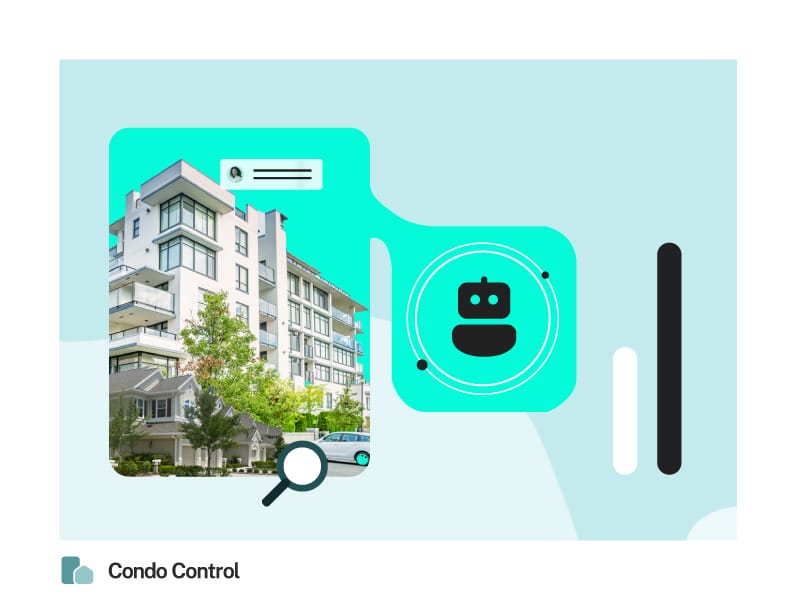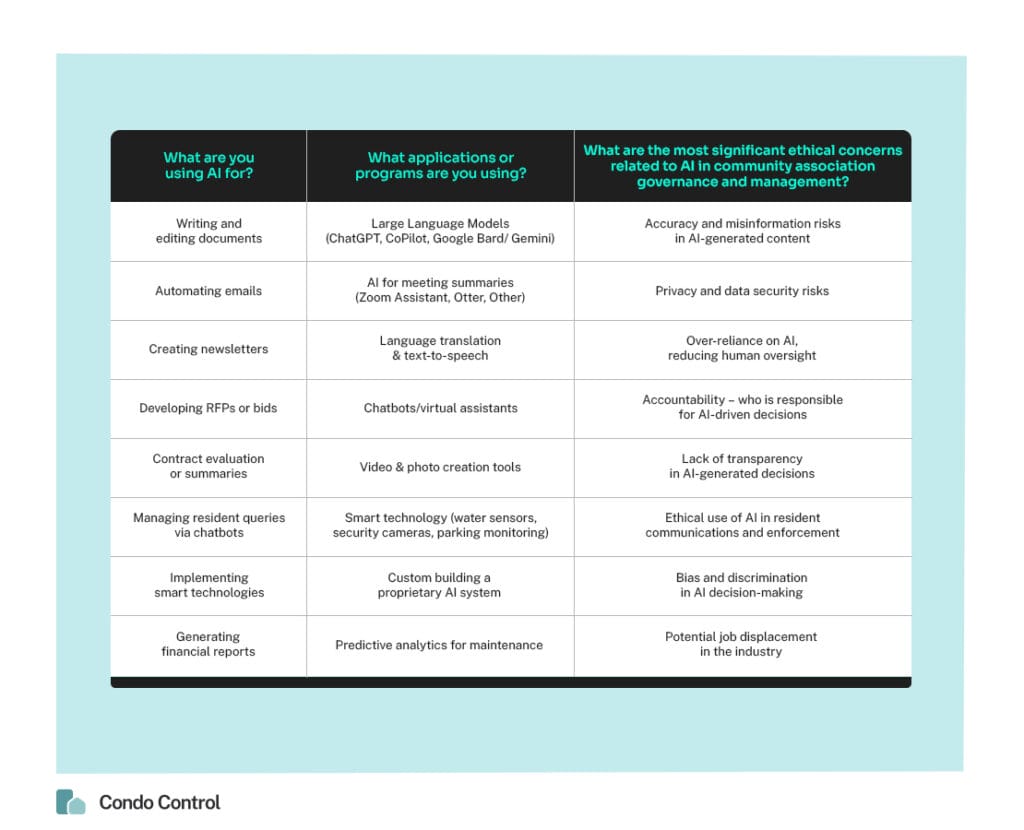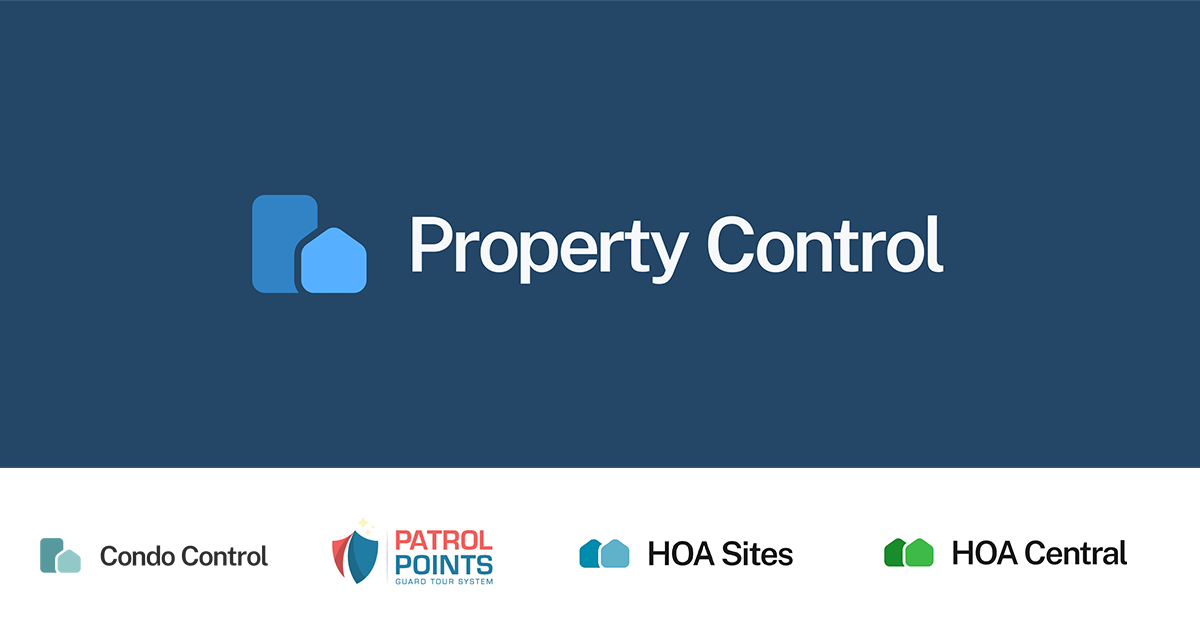When technology is designed to replicate human functionalities, human errors and biases will inevitably make their way into the systems or machines. It is essential to acknowledge how these unconscious associations can impact outputs and results.
You might be thinking, that sounds important, but what does this have to do with condo or HOA management?
With the rise of AI, it’s more relevant to residential community management than you may realize. Read on to learn more about ethical AI and why it matters when managing a condo or HOA.
Table of contents
- What is ethical AI?
- Are condos and HOAs really using AI already?
- Key principles of ethical AI for condos and HOAs
- AI best practices for boards and managers
What is ethical AI?
AI ethics facilitate a healthier relationship between humans and technology. When ethics are applied to AI usage, people are less likely to blindly trust AI systems to perform perfectly.
Consequently, approaches that enhance thoughtful AI trustworthiness generally reduce negative AI risks.
When trying to assess the credibility and trustworthiness of an AI system, experts recommend evaluating the following criteria:
- Reliability
- Safety
- Security
- Accountability
- Transparency
- Fairness
- Explainability and interpretability
For condo and HOA communities, ethical AI means integrating smart technologies—like chatbots, automation, predictive analytics, and video systems—while ensuring these systems serve residents fairly, respect privacy, and foster trust.

AI ethics encourage management and board members to consider what impact an AI system could have on residents.
Without ethical safeguards:
- Biased algorithms may lead to unfair treatment in resident screening or rule enforcement
- Mismanaged data can result in privacy breaches
- Opaque systems undermine resident trust
The earlier you can get acquainted with AI ethics, the better. While exercising more critical thinking when using AI won’t guarantee a problem-free experience, it will be easier to identify potential issues and resolve them if they occur.
Are condos and HOAs really using AI already?
Yes! Research suggests many condos and HOAs are presently using AI.
In most cases, it’s for tasks like providing answers to commonly asked questions or drafting communications, but more advanced capabilities are on the horizon.
The Foundation for Community Association Research published an interesting study about AI and community association management.
Role
478 participants provided feedback. 43% were managers, 28% were volunteers, 18% were executives, and 11% were business partners.
Familiarity with AI
Of those people, 71% (about 340 people) said they were using AI in some capacity.
Half said they were somewhat familiar with AI, while 33% said they were very familiar.
Use cases
When asked what they were using AI for, most said communication, followed by event planning and managing vendors/soliciting bids.
Ethical concerns
When it came to ethical concerns, most respondents cited accuracy and misinformation risks as their main concern (75%). Privacy and data security risks was second(70%). Over-reliance on AI, reducing human oversight, was third (68%).
AI and community association management

The fact that respondents questioned the reliability of AI-generated content (citing errors, the need for fact-checking, and potential misinformation or hallucination), and data privacy, is reassuring.
People who care for communities acknowledge that there is a clear gap in understanding how to effectively use AI.
There is a real need for more training and education on how AI tools work, how to effectively use them, and how to integrate them into workflows, particularly for staff and community managers.
We expect AI courses and educational webinars for board members and managers to become more prevalent soon, but for now, you can use resources from the CAI to guide you.
McKinsey & Company, a global management consulting firm, does not cater specifically to community associations; however, it offers lots of quality (and free) information about how organizations can use AI effectively and responsibly.
Key principles of ethical AI for condos and HOAs
Whether you are only planning to use AI to answer resident questions, or you’ve got plans to employ AI solutions for financial forecasting, predictive maintenance, and the works, keep these principles in mind as you integrate artificial intelligence into your workflows.
Data protection
Protecting resident data should be a top priority, no matter what you are doing. AI systems must comply with data protection laws, where applicable, and protocols should be in place to securely store any personal information.
If you cannot trust the AI platform to safeguard residents’ autonomy, identity, and dignity reasonably, then it’s not the right platform.
Always treat sensitive information with care and consideration. For example, if you are uploading documents to a shared digital database that can be searched by an AI program, ensure the personal data is either redacted, or added to files with restricted access.
Use any safety features that come with the AI platform. Multifactor authentication is still one of the best security features available to everyone.
Look for solutions that support end-to-end encryption for resident data storage and transmission.
Finally, limit AI’s access to “only necessary data” to prevent over-collection or misuse.
Transparency
Residents must be informed about how AI is used, what data it collects, and how decisions are made.
You can start by:
- Communicating data collection policies. If you’re not sure about this, ask the company providing the AI solution how data is used and protected
- Providing residents with opt-in or opt-out choices. Choice gives them a sense of control, which is important
- Share best practices to help residents avoid data privacy complications. For example, advise them to avoid sharing personal information with chatbots. Knowledge is power, and they will appreciate the guidance
Accountability
Work can be outsourced, but accountability cannot. Boards and management should establish oversight procedures so that someone is responsible for AI-driven decisions.
This includes having steps in place for residents to raise concerns or appeal decisions made by AI systems. If you don’t feel comfortable with this, then it’s a sign not to use AI for those responsibilities.
Fairness
AI systems should avoid discriminatory practices. This may mean actively identifying algorithmic biases and ensuring outcomes are fair. This is relevant if you are using a program to prioritize requests, screen applications or identify violations.
AI best practices for boards and managers
AI is exciting; it has the potential to save condo and HOA communities thousands of dollars, lighten heavy workloads for overburdened staff, and create happier, more informed residents.
But, like any tool, it needs to be used responsibly. If you’re just starting to familiarize yourself with AI tools and applications, keep a few of these tips in mind:
- Clearly define your association’s objectives for using AI. Just because you can use a program doesn’t mean you should
- Develop written policies on data usage, privacy, and AI decision-making. Not only does this manage resident expectations, but it gives the board a chance to thoroughly review how the system or app works, and identify weaknesses/liability issues
- Educate residents on how the AI tool works and how their information is handled
- Create opportunities to collect feedback, and assess how well the system is working for your community
- Keep an eye out for legal and ethical requirements relevant to HOA and condo governance. There is not too much governing AI usage right now, but that could easily change
Ethical AI is not just about avoiding liability issues, it’s about balancing people’s dignity and privacy with innovative, efficient tech solutions.
























